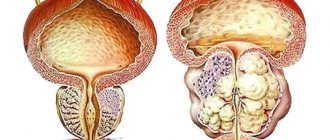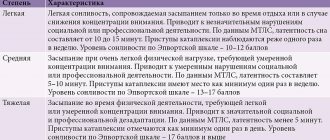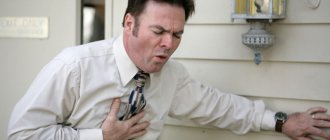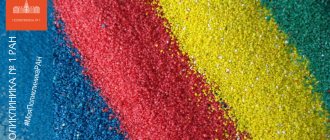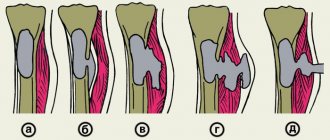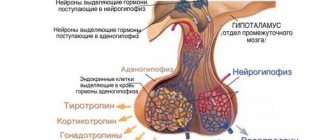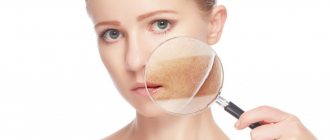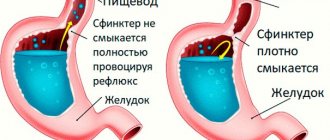Proctitis is an inflammatory disease that is localized in the rectum. First of all, it affects the intestinal mucosa. Very often, proctitis occurs together with sigmoiditis - inflammation of the sigmoid colon (in this case we are talking about proctosigmoiditis).
According to WHO, the risk of developing this disease is observed in 60% of residents of developed countries. Therefore, it is important to remember that early diagnosis plays an important role in the treatment of this disease. Over time, untreated proctitis develops complications and becomes chronic.
At CELT you can get a consultation with a proctologist.
- Initial consultation – 3,000
- Repeated consultation – 2,000
Make an appointment
Causes of the disease
The cause of the disease is the inflammatory process. The reason for the development of the disease can be a variety of factors:
- Excessive consumption of hot foods, spices and alcohol (proctitis of nutritional origin).
- Gonorrheal – occurs as a complication of gonorrhea, usually due to incorrect treatment of the underlying disease.
- “Congestive” – this form affects people suffering from constipation. It may occur against the background of trauma to the intestinal walls.
- Radiation – occurs after a course of radiotherapy aimed at the pelvic organs. Currently, innovative irradiation techniques are used, and the risk of developing radiation proctitis is reduced. Previously, this form of the disease was quite common.
- The parasitic form affects individuals suffering from parasitic intestinal infestations by protozoa and helminths.
There are diseases and conditions that do not directly cause proctitis, but contribute to its development and seriously increase the risk of the disease:
- Hypothermia.
- Inflammation, intestinal injury.
- Haemorrhoids.
- Infectious diseases of the rectum.
- Anal fissures.
- Paraproctitis.
- Abscesses of the intestinal wall.
- Inflammatory diseases of neighboring organs.
- Infectious diseases of the genitourinary system.
List of sources
- Vorobyov G.I., Zaitsev V.G. Incidence of the population with diseases of the colon, anal canal and perineum // Current issues of coloproctology. - Ufa, 2007. - P. 550-554.
- An V.K., Rivkin V.L., Solomka A.Ya. Dangers, complications and errors in proctology. - M., 2011. -112 p.
- Tkachev A.V., Mkrtchan L.S., Nikitina K.E., Volynskaya E.I. Inflammatory bowel diseases: at the crossroads of problems // Practical. medicine. 2012. T. 58. No. 3. P. 17–22.
- Valuyskikh E.Yu., Svetlova I.O., Kurilovich S.A., Osipenko M.F., Maksimov V.N., Voevoda M.I. Clinical and genetic aspects of inflammatory bowel diseases. Russian Journal of Gastroenterology, Hepatology and Coloproctology. - 2008. - T. 18. - No. 6. - P. 68-74.
- Radiation (radiation) damage to the intestine / Burkovskaya V.A. // Gastroenterology of St. Petersburg - 2013 - No. 3-4.
Symptoms and forms of the disease
Based on clinical manifestations, there are two main forms – acute and chronic. These two varieties most clearly differ from each other in the symptoms and complaints of the patient.
- It begins suddenly, without preconditions or malaise.
- Body temperature rises to 38-40 degrees.
- Chills occur.
- False urges to go to the toilet appear, and at the same time constipation appears.
- Pain in the rectum is often accompanied by a feeling of heaviness.
- There is a burning sensation and itching in the anal area.
- There may be blood in the stool.
Acute proctitis occurs quite rarely, much more often patients present with the chronic form. At the same time, an acute disease occurs with great discomfort for the patient. The patient's subjective sensations are very unpleasant. Symptoms of the acute form force you to consult a proctologist immediately.
There are several morphological forms of acute proctitis:
- Catarrhal hemorrhagic proctitis. This form of the disease is characterized by severe swelling of the intestinal mucosa. Non-systemic submucosal hemorrhages (hemorrhages) occur.
- Catarrhal mucous proctitis is characterized by the accumulation of large amounts of mucus in the intestinal lumen.
- Catarrhal purulent proctitis is characterized by the presence of pus on the surface of the edematous mucosa.
- Separately, the polypous form is distinguished when, upon examination, polyps are detected on the intestinal mucosa.
- Erosive, ulcerative proctitis is a special form. It is characterized by the formation of long-term non-healing erosions and/or ulcers on the rectal mucosa.
Ulcerative proctitis is one of the most severe forms of proctitis. Upon examination, you can find many lesions and ulcers on the intestinal walls. The course of the disease is characterized by the slow spread of the pathological process; inflammation affects one part of the intestine and spreads further. This may be a manifestation of a serious inflammatory disease - nonspecific ulcerative colitis (UC).
Diet
Diet for proctitis, along with hygienic procedures and drug therapy, is the most important component of treatment, which is based on therapeutic Tables No. 3 , 4 ( 4a , 4b ) and is specifically determined by the type of functional disorders present - diarrhea/constipation. The basis of therapeutic nutrition for acute proctitis/complications of chronic proctitis is maximum mechanical/chemical sparing of the rectal mucosa. This requirement is achieved by eliminating all irritating foods from the diet.
First of all, the consumption of food containing plant fiber, which irritates the intestinal mucosa and increases gas formation, is limited: all spicy/spicy/fried foods, pickles, smoked legumes, salads and canned vegetables are completely removed from the daily diet. Freshly prepared juices, fruits/berries, sweets, chocolate, bran, seeds, dried fruits, and nuts are excluded. Drinking alcoholic and carbonated drinks is strictly prohibited.
The basis of nutrition is soups in non-concentrated chicken/vegetable broth, well-cooked porridge in water, soft-boiled chicken eggs, semi-liquid dishes, boiled fish/steamed meat, steamed cutlets, cottage cheese, low-fat yogurt, kefir, jelly, rosehip decoction. Bread - in the form of crackers or stale white. Fruit: baked apples. The amount of fluid consumed should be 1.5-2.0 l/day.
During the remission stage, the diet is expanded by including kefir and sour cream, vegetables/fruits (carrots, potatoes, cabbage, plums, strawberries, apples) consumed in moderation. In case of diarrhea, it is necessary to include in the diet foods that help slow down intestinal motility: mashed potatoes, mucous, pureed dishes (non-concentrated soups, minced meat dishes, pureed porridges, pureed rice, jelly, jelly), as well as products with an astringent effect - strong tea, quince decoctions, pomegranate peel, dogwood, bird cherry, pear, lingonberry, blueberry.
In cases of constipation, the diet includes foods that help activate the motor function of the intestine, as well as promote the act of defecation: foods that contain coarse plant fiber: wholemeal bread (bran, grain), cereals, sauerkraut, vegetables/berries/fruits, dried fruits (figs, prunes), muesli, as well as vegetable oils. It is recommended to increase the amount of fluid consumed to 2-2.5 l/day through mineral water, green/herbal tea, apricot, plum, carrot, pumpkin and peach juices. Taking bifido-drugs is indicated.
Chronic proctitis
The chronic form of the disease is widespread. It occurs unnoticed, so in the first stages of the disease, patients do not rush to see a doctor.
Standard disturbing symptoms are practically absent, often only local discomfort is observed:
- Irritation in the anal area.
- Discomfort before or after bowel movement.
- Burning, itching in the rectal area.
These symptoms do not cause concern in patients at first. Many patients prefer to treat themselves or simply wait. It is important to know that this is a fundamentally wrong approach: without treatment, the pathological process only intensifies. If you do not follow a diet, then “wrong” food in the absence of treatment will provoke increased secretion of mucus and pus, the progression of the disease.
Chronic proctitis can cause many serious complications. In some cases, you will have to resort to surgical treatment. The key to recovery is a timely visit to a proctologist, diagnosis and compliance with all doctor’s recommendations.
Diagnosis and treatment of proctitis
Endoscopic polypectomy of the intestines and stomach
- Cost: 15,000 - 40,000 rubles.
- Duration: 5-15 minutes
- Hospitalization: 1-3 days
More details
Diagnosis begins with collecting anamnesis. The proctologist interviews the patient, clarifies complaints and the history of the disease. Usually instrumental studies are prescribed, since the chronic form does not have a specific clinical picture and is difficult to recognize only from the patient’s complaints. Diagnostics consists of examination, instrumental studies and laboratory tests. During the examination, the proctologist performs a digital examination of the intestine, anoscopy, and sigmoidoscopy (instrumental endoscopic examination of the rectum).
To assess inflammation, laboratory diagnostic tests are performed:
- Stool tests (coprogram, microflora culture, calprotectin).
- Clinical tests of blood and urine.
- Cytological and histological studies of intestinal material taken during biopsy during examination, and others.
Modern methods of diagnosis and treatment allow therapy to be carried out in an outpatient setting. The patient does not have to be in a medical hospital. First of all, the patient is explained the features of the diet, without which treatment is impossible: avoidance of alcohol, spicy, fried, fatty foods, herbs and spices.
Based on the results of laboratory tests, treatment is selected, including antibacterial therapy (depending on the causative agent of inflammation). Local anti-inflammatory drugs are used in the form of suppositories and microenemas. They help alleviate the condition and relieve the main symptoms.
To combat constipation and maintain normal bowel function, a number of procedures are prescribed: from medications to special exercises. It is generally accepted that proper treatment is a set of measures, each of which is important in its own way.
In some cases, surgical treatment may be used - for example, for polyps. The need and scope of the operation are calculated individually for each case.
Phases of radiation damage
Depending on the timing of appearance, early and late radiation damage are distinguished. Early ones make themselves felt directly during radiation therapy, or within 100 days from the date of its completion. This period (100 days, or three months) is the deadline for epithelial recovery from sublethal damage. At this stage, the etiological factor is damage to the intestinal epithelium with the development of inflammatory reactions. If the radiation dose is small, the epithelium is restored quite quickly, and, accordingly, the mucous membrane returns to normal. On average, this takes about 2-4 weeks from the last radiation session.
Late radiation injuries develop 100 days after the end of radiation therapy. During this period, vascular disorders due to damage to the endothelium come first. Its cells become necrotic, and in order to restore them, the remaining endothelial cells begin to actively proliferate. This leads to obliteration of the lumen of blood vessels, the development of thrombosis, ischemia and trophic disorders. As a result, radiation vasculitis develops with bleeding, atrophic processes, fibrous changes, and the proliferation of scar tissue.
Prognosis and prevention
Prevention of the development of complications is the timely treatment of any acute gastrointestinal diseases, as well as observation by a doctor and correction of chronic diseases of the stomach and intestines.
The prognosis for proctitis is generally favorable: with proper treatment, it is possible to completely eliminate the manifestations of the acute form of the disease. Treatment of chronic proctitis lasts almost a long time, and episodes of exacerbations are possible. The success of therapy depends on the individual characteristics of the body, as well as on compliance with the treatment plan.
At the CELT clinic, leading specialists consult on your health issues. Polite and friendly doctors will help you recover. The CELT proctology service offers consultations with high-class proctologists. Start treatment on time and you won’t have to suffer from the disease for years.
Make an appointment through the application or by calling +7 +7 We work every day:
- Monday—Friday: 8.00—20.00
- Saturday: 8.00–18.00
- Sunday is a day off
The nearest metro and MCC stations to the clinic:
- Highway of Enthusiasts or Perovo
- Partisan
- Enthusiast Highway
Driving directions
